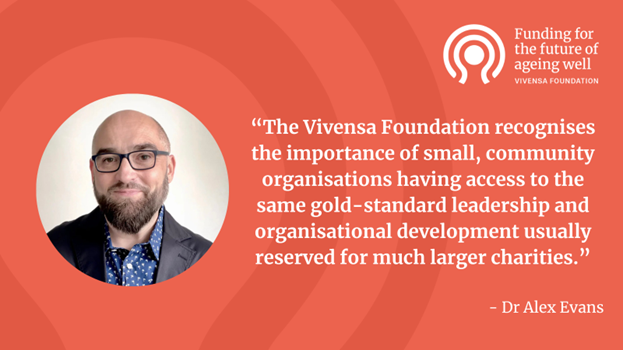Community-led organisations working with older people face many pressures: funding gaps, stretched teams, and the loneliness of leadership. Leaders often find themselves solving immediate problems while lacking the headspace to think strategically.
Training can help, but traditional “free training” has too often failed these organisations. It is frequently generic, promotional, or disconnected from the sector’s real challenges. That’s why we launched the Capability Development Programme. Delivered by Moore Kingston Smith Nonprofit Advisory and the University of Birmingham, the programme represents a new model of support: rigorous and sector-specific.
What makes the programme different
The programme is shaped around the RRISE framework: research readiness, reimagining organisations, impact, sustainability, and efficiency. The structure combines:
- Blended learning: webinars, seminars, action learning sets, and residentials.
- Practical application: each organisation receives a £15k grant to test and apply learning alongside sector experts.
- Reflective leadership development: a rare space for senior leaders to pause, think, and share with peers.
- Quality assurance: delivered by experienced charity leaders, academics, and nonprofit consultants.
Dr Alex Evans, who leads on leadership development, says: “Leadership programmes are normally extremely expensive. The Capability Development Programme is gold-standard training for people who would never otherwise get it. But the real luxury here is time. Leaders get the space to reflect on what their role means, hear from experts who really know their stuff, and test new approaches with their peers. That mix of practical skills, reflective practice, and peer support is unusual — and it’s powerful.”
Reflections and impact from Cohort 1
The first cohort included Chiltern Music Therapy, Elders Council of Newcastle, Leeds Older People’s Forum, Moorlands Homelink, and Northamptonshire Carers. Their journey began with sessions on research readiness and sustainability, before moving into deeper work through seminars, peer-led action learning sets, and applied projects funded through their grants.
Participants spoke about the confidence they gained, both as individuals and as organisations. They also highlighted the value of having time to think, something that can feel impossible in the day-to-day rush. One leader noted: “It’s given me space to reflect and to plan how I approach conversations. The action learning sets helped me think more deeply, rather than just rushing through things. Having a trusted cohort of people going through the same challenges made a real difference.”
The year culminated in a residential in Derby, where the cohort consolidated their learning, reflected on their growth, and forged lasting peer networks.
To ensure the outcomes of the training are properly captured, feedback was gathered from the participants, which will go on to inform future cohorts. Some of the most significant outcomes include:
- Leadership growth: Leaders reported increased confidence, legitimacy, and resilience. As Alex noted: “People began to see themselves as leaders — not because they became more forceful, but because they felt they had the right to lead and the confidence to make considered decisions.”
- Organisational improvements: Cohort members advanced their approaches to strategic planning, governance, financial management, and impact measurement.
- Research collaboration: Leeds Older People’s Forum, for example, strengthened research partnerships to evidence its work more robustly.
- Peer support: Action learning sets were repeatedly described as “invaluable,” helping leaders feel less isolated and more supported.
This all goes to show that capability building isn’t an optional extra. Without it, organisations remain stuck in short-term survival mode. With it, leaders feel more confident in their roles, boards engage more deeply with strategy, and charities can show evidence of their impact to funders and commissioners.
As Alex points out, it isn’t just about skills: “Leaders realised they’re not alone. Everyone struggles. Knowing that, and having peers to talk it through with, makes a huge difference.”
Tackling sector scepticism
Many organisations are understandably wary of free training. Too often, such offers have turned out to be superficial or tied to a sales pitch. There is some excellent training available in the sector, but the challenge is that quality can be inconsistent.
Alex recognises that concern: “People are right to be cautious. There’s a real mix out there – some great opportunities, like university programmes, but also a lot that don’t quite deliver what small organisations really need. The Capability Development Programme is different. It’s not free, it’s funded. It’s funded because the Vivensa Foundation really cares about these small community organisations who otherwise would not be able to access extremely high quality training.”
The next chapter
The lessons from Cohort 1 are shaping the future of the programme. Cohort 2 will build on this foundation, expanding opportunities for peer networks, co-produced learning, and shared resources through the Vivensa Academy.
As Alex reflects: “The Capability Development Programme shows what can happen when you invest in people as much as in projects — the ripple effects go far beyond one organisation.”
If you work in, or lead, a community-led organisation working with older people, we encourage you to consider joining the Vivensa Academy. Once you’re a member, you’ll find you have access to some of the resources from the Capability Development Programme, which you’ll be able to explore in your own time. And it’s a chance to be part of a growing community of leaders shaping the future of health, housing and well-being services for older people.
Visit our Capability Development Programme playlist on YouTube, where you can watch a conversation series between Dr Alex Evans and Sara Ramsey, plus videos to introduce the Research Framework and the RISE Framework.

